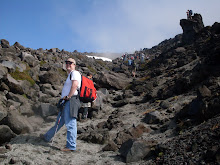I just finished reading
In Search of Paul by John Crossan and Jonathan Reed. Overall it was a heavy read, but I learned some interesting things. Paul uses metaphors that would have made sense to people of that time. However he takes themes common in Roman Imperial theology gives them a twist. For example a common theme was Ceasar Agustus was a god, who saved the world by giving it peace through victory. He was a conquering king. Jesus was savior of the world, but he did it by becoming a servant. Quite a contrast. Whereas Rome preached peace and victory, Paul preached grace and peace. Peace was acheived using much different methods.
One interesting note concerns 1 Thessalonians 4:16-18 (RSV).
16For the Lord himself will descend from heaven with a cry of command, with the archangel's call, and with the sound of the trumpet of God. And the dead in Christ will rise first; 17then we who are alive, who are left, shall be caught up together with them in the clouds to meet the Lord in the air; and so we shall always be with the Lord. 18Therefore comfort one another with these words.
This text is closely modeled on the practice of greeting important dignitaries visiting a city. Say a king is coming to town. The city officials would meet the king outside the city and accompany him into town. In addition most cemetaries were located just off the road outside a city. So Paul uses this metaphor of greeting the king to describe what the end of time would be like. Now I have heard many Adventists argue that this text says that Christ won't touch the ground, but we will meet him in the air. However the text itself is ambiguous and if Paul truely meant to base his discussion on a common practice of his day, I don't think we can assume that this text says what we think it says.
The book contains a heavy dose of descriptions of Roman society, archeology, and the writings of Paul. I had trouble focusing on certain sections, but overall I am glad I read the book. Learning about Roman society also helped me to understand Revelations and also early church history. You can see how Roman ideas about patronage resulted in veneration of Saints.

